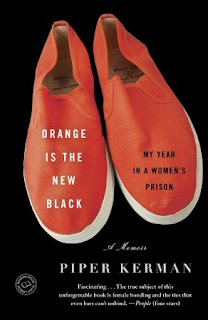Orange is the New Black: My Year in a Women's Prison
Diving into this memoir of Piper Kerman's year in a federal women's prison a decade after a youthful drug offense conviction, I had some pre-conceptions of what I would get based on having watched (and deeply loved) seven seasons of the Netflix show based on it. While I was in no way disappointed by Ms. Kerman's story and was delighted each time I recognized re-named characters in her tales of her real-life fellow inmates, I realized very quickly that the show took major creative liberties with the true story. If you're looking for a re-telling of the show, it's not in these pages, though you will recognize aspects. The truth is - I didn't mind it. I thought I would, but it turns out that the actual version of events stands alone quite effectively without the extra embellishment. Sure it's missing all the pumped up volume, drama, danger and frankly, sex, of the show, but what it does offer is an accurate, illuminating, sometimes harsh, sometimes humorous and often poignant look at real women facing a situation that most of us could never imagine.
By stripping away the TV notion of prison, it focuses your attention more realistically on the effects that incarceration has on a human being and how, in extreme situations like this, people find ways to endure, if not always thrive. You see women forming their own bonds and "families" despite coming from often very different ethnic, socioeconomic and cultural backgrounds. The necessity of having each others' backs creates a unity that is actually very touching and sweet at times. Certainly it's not all lovey-dovey and drama-free, but it's far more civil than might be imagined. The sobering truth, as the author reveals, is that most often the only people these prisoners can rely on for kindness or help is each other. The large majority are low-level crime, non-violent offenders who could likely be rehabilitated with social and job supports, but get caught in a cycle of poverty and circumstance they can't easily escape. She paints a picture of a criminal justice system that is over-stressed and filled with employees who often see their jobs on the best days as little more than clocking in and out, and on the worst days as being an opportunity to unreasonably wield their power over people in no position to defend themselves.
Ms. Kerman is the first to admit that her status as an attractive, white, college-educated American woman from a moneyed family garnered her unfair favor at times inside the prison and certainly set her up for better success after leaving prison, and I respect that she's continued to use her position of privilege to draw attention to the American prison system and reforms that need to be made. Her experience in prison, while horrible for her, also gave her empathy and a self-understanding she might otherwise have never had.
★★★★ ½

.jpg)

Comments
Post a Comment